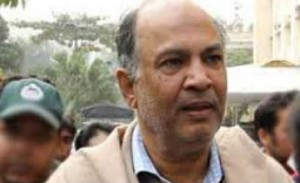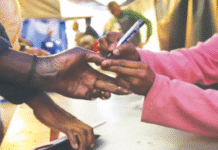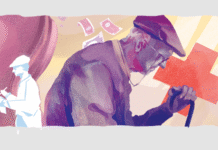On Wednesday, security by the Bangladesh government was beefed up in the capital city of Dhaka and port city Chittagong. The measures were taken ahead of the final verdict on the appeal by senior opposition leader and parliamentarian Salauddin Quader Chowdhury against a death sentence awarded to him by a war crimes court on October 1, 2013.
On the date in 2013, Chowdhury, 66, was found guilty by the court in nine charges out of 23 brought against him. The proven charges included genocide, murder, torment, and extradition of people in 1971 who were striving for liberation of Bangladesh from West Pakistan at the time.
But the top court maintained the decision of capital punishment for Chowdhury satisfying the family members of those, whose loved ones were tortured and killed by Chowdhury and his men in 1971.
The sentencing has also ‘surprised’ Bangladesh Nationalist Party (BNP), the main opposition party, as they claimed that Chowdhury has been denied justice.
On Wednesday, the tribunal maintained the sentence of capital punishment made against Chowdhury for proven charges including the murder of Nutan Chandra Singa, genocides at Sultanpur Banikpara and 69-para and the murders of Sheikh Mozaffar Ahmed and his son Sheikh Alamgir in 1971.
The other proven charges against Chowdhury include the genocide at Madhya Gahira, Jagatmollopara, the murder of Satish Chandra Palit and the torture of Nizamuddin and Salahuddin.
In 1971, the Pakistan army and its local collaborators had swooped on the populace after East Pakistan, later Bangladesh, demanded freedom from West Pakistan under the leadership of Sheikh Mujibur Rahman, father of Bangladesh’s present Prime Minister Sheikh Hasina.
The nine-month long bloody war that ensued saw the deaths of reportedly three million people, the rape of 200,000 to 400,000 women and displaced millions of others.
Finally, Bangladesh was formed following the defeat of Pakistan forces and its collaborators in Bangladesh territory.
During the war, Chowdhury’s father was an influential politician who worked to prevent Bangladesh from breaking away. It was mentioned in the war crimes court in 2013 that Chowdhury’s house in Chittagong was used as a torture cell during the war.
Sheikh Jahangir, son of Mozaffar Ahmed and brother of Sheikh Alamgir, is satisfied with the verdict.
Jahangir shared that on April 17, 1971, Mozaffar and his family members were returning home in Rahmatganj from Raozan in Chittagong by car. Upon reaching Hathazari, their vehicle was obstructed by Chowdhury, along with some Pakistani army personnel.
The group abducted Mozaffar and Alamgir and took them to a nearby army camp. The family later learnt that the two were murdered.
Jahangir would have been abducted by Chowdhury’s goons and killed as well in 1971 if he would not have heeded his father and fled to Puinchhari in Cox’s Bazar earlier.
Mozaffar Ahmed was the founder of Awami League in Chittagong, whose main leader Mujibur Rahman had called for the freedom of Bangladesh from West Pakistan.
Jahangir, who is a few years shy of becoming an octogenarian, said to local media, “Since the incident, all we ever wanted is justice and to see Salauddin hanged”. “Now I want to see the quick execution of the verdict,” he added.
The verdict was naturally not well received by the main opposition BNP which has alleged since the formation of the war crimes court in 2010 in Bangladesh that the cases being filed are “politically motivated”.
While talking to Asia Times on the matter, Shyrul Kabir Khan, a BNP spokesperson, said, “Our party believes that Chowdhury has been sentenced to death unfairly.”
On Wednesday, the party had officially told the media at their headquarters: “We believe Salauddin Quader has been denied justice …We’re frustrated, surprised and saddened at the verdict.”
Also in 2013, former BNP leader Abdul Aleem was also sentenced to imprisonment till death for crimes against humanity including genocide, looting etc. during 1971. Aleem passed away in jail.
Additionally, the war crimes court has delivered verdicts against a number of senior Bangladesh Jamaat-e-Islami leaders for their involvement in similar crimes during the war. Jamaat had actively denounced the liberation war of Bangladesh and sided with Pakistan in 1971.
As Jamaat is one of the major political allies of the BNP-led 18 party alliance in Bangladesh for more than a decade now, the opposition alliance has remained rather weak over the past few years.
Similar verdicts against Islamist politicians had previously sparked violence throughout the country.
But despite verbally protesting against the verdict on Wednesday, the BNP did not call for agitations as it has become significantly docile after carrying out a three-month long nationwide traffic blockade in an attempt to overthrow current Bangladeshi Prime Minister Sheikh Hasina.
Over the past few months, most of BNP’s senior leaders have been arrested on different charges for agitation during the blockade.
Syed Tashfin Chowdhury is a Dhaka, Bangladesh-based freelance journalist and the editor of Xtra, the weekend magazine of New Age, a leading English daily in Bangladesh.
(Copyright 2015 Asia Times Holdings Limited, a duly registered Hong Kong company. All rights reserved. Please contact us about sales, syndication and republishing.)
Source: AsiaTimes










